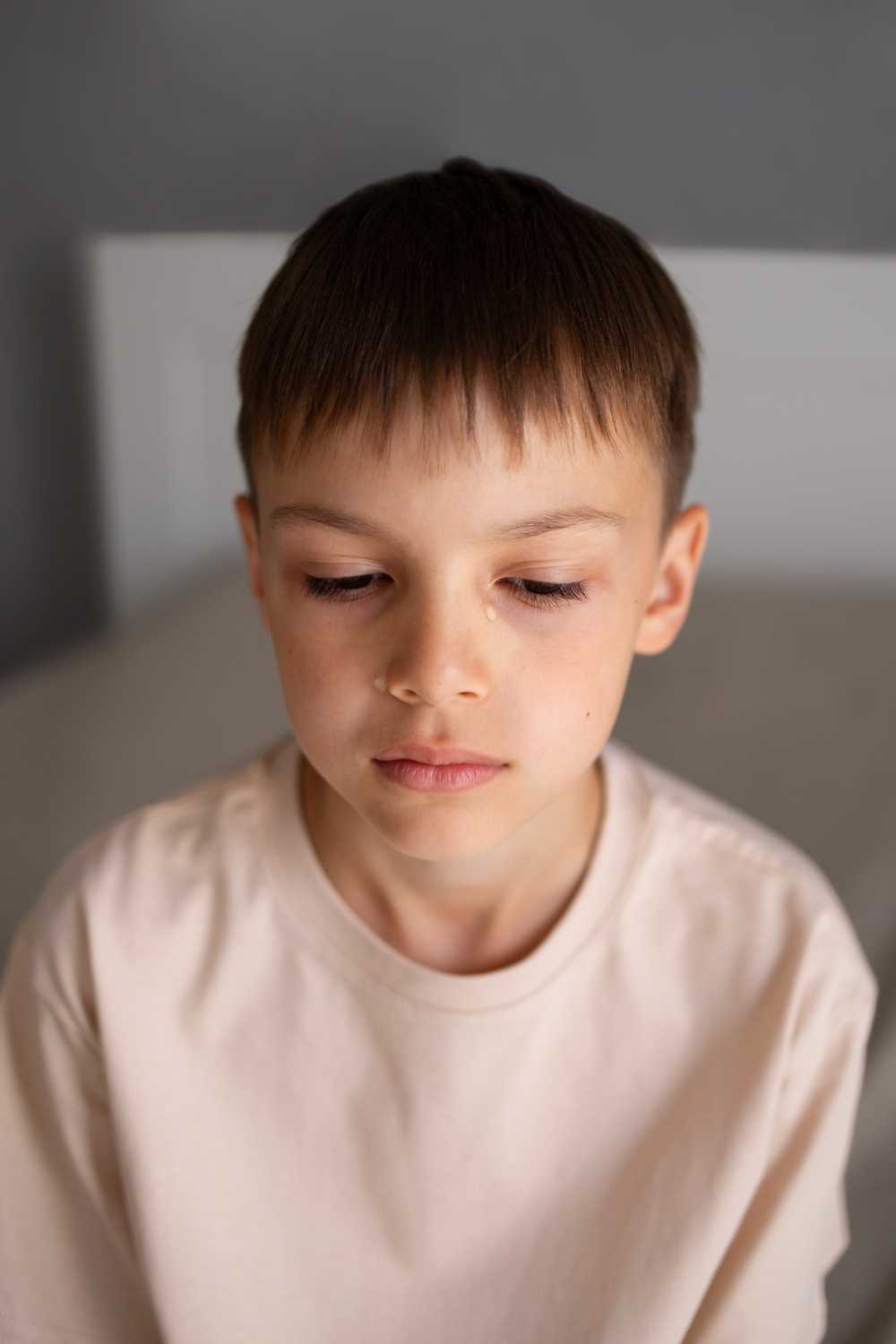I said no. I said it plainly, early, repeatedly. I said it in writing, I said it on the phone, I said it from a place of trembling grief and exhausted clarity. I said it as a mother who had already tried everything. I said it after describing the diagnostic framework, after explaining what worked, after citing the psychological report.
And they kept going anyway.
When I stood in the fish section of Superstore, sobbing into my phone, begging POPARD to stop pushing reward charts onto my already-traumatised child, I still believed—on some level—that if I just explained it right, someone would hear me. She had a psychology degree, so I imagined, if I could just detail the impact that she would be reasonable. But the handouts had already gone out. The email had already been sent. The consultant had already described our refusal as a kind of resistance to “evidence-based” practice, and the school had already decided what support would look like. It didn’t matter that I had withdrawn consent, school had used their report as a smoke screen.
This wasn’t misunderstanding. This was domination. And its violence came dressed in the soft language of help.
-
Rot at the root: Why POPARD must be dismantled from the top down
When I first objected to the strategies POPARD proposed, I tried—truly—to assume good intent: that if I just gave them the right information, the clearest language, the most generous interpretation of their mandate, they would course-correct and stop pushing reward charts onto an…
Institutions do not hear no; they absorb complaint
Sara Ahmed writes that institutions smooth over harm by absorbing complaint into process—by turning emotional ruptures into paperwork, urgency into protocol, moral distress into management. When families cry out in grief and refusal, institutions often respond with a kind of bland reassurance: we hear you, we value your input, we are following best practice. In this way, the complaint becomes part of the institutional surface rather than a rupture that demands transformation.
What I experienced from POPARD, and from the school that embraced their charts with something close to relief, was exactly that: an institutional refusal to treat my refusal as valid. I did not say I need different strategies. I said this framework is coercive and abusive, and it is causing my child harm. I named the damage, I described our values, I offered a viable alternative supported by clinical reports and lived success—and still, the school took the handouts as permission to proceed.
When Sara Ahmed says that complaint is often treated as evidence of your own failure to be reasonable, I understand that in my bones. Because the more clearly I spoke, the more my words were reframed as resistance to help. The more precise I became, the more tightly the institution clung to its script.
-
Shut it down: Why POPARD cannot be trusted to support neurodivergent children
We asked for help.We got a behaviour chart. We invited experts into our child’s life, hoping they would help school staff understand his anxiety, his trauma responses, his fiercely sensitive nervous system. We asked for relational strategies grounded in respect and attunement. We…
Slow violence wears the body down
Jasbir Puar’s writing on debility offers a framework for understanding what this kind of consent-less intervention does over time. In The Right to Maim, Puar explores how institutions manage bodies not only through direct violence, but through slow attrition: the wearing down of agency, the calibration of tolerance, the suppression of resistance until it no longer speaks.
Schools use phrases like building tolerance, growing resilience, and building independence. What they really need mean is acclimating to a feeling unending pain. Assimilating to a culture that predicates our participation on our agreement to be slowly destroyed. I destroys children and their families.
Just a PArent
What ABA-derived strategies do to PDA children, and what the people who impose those strategies do to the families who resist, is slow cumulative violence. It is so thoroughly institutionalised that naming it feels like overreacting—until you realise that what you are naming is a system designed to extinguish your child’s autonomy and reframe that extinguishing as care.
What I witnessed in my son was not progress. It was erasure. A withdrawal from trust. A collapse of will. And what I experienced, as a parent trying to hold the line against this erasure, was a slow psychic breakdown—because to object within a system that refuses objection is to become, in the eyes of that system, the problem yourself.
When help becomes the vector of harm
There is violence in being told that the thing hurting your child is what’s best for him. It mirrors the gaslighting of abuse so precisely that you begin to doubt your own clarity.
Many autistic and ADHD parents have already endured coercive relationships in the past means that this kind of gaslighting is more likely to provoke a trauma response.
The charts, the points, the escalating response ladders—they arrive bearing the seal of authority, the promise of neutrality, the reassuring cadence of procedure. But when those tools are used against your will, after you have clearly stated your ethics, your diagnosis, your evidence, and your refusal—they become instruments of institutional violence.
Ahmed calls this the “non-performativity” of institutional commitments—the way that saying inclusion, or care, or neurodiversity becomes a substitute for actually enacting it. Puar calls it the logic of maiming—support not as liberation but as subjugation, shaping bodies and behaviour into tolerable forms. And I call it what it is: a betrayal so total that it leaves no safe harbour behind it. Because when a public institution insists that help must look a certain way, and then proceeds despite your grief, what they are doing is not helping. They are asserting ownership over your child’s experience.
And that is abuse.
Legal perspective
Section 8 of the BC Human Rights Code prohibits discrimination in services (including education) on the basis of disability. When schools or public agencies use behavioural strategies that exacerbate distress, violate sensory or psychological safety, or contradict an established diagnosis, they fail in their duty to accommodate. And when they continue to apply those strategies after a family has explained their harmful impact, that failure becomes willful discrimination.
Accommodations are not about doing what is convenient. They are about doing what is necessary to preserve dignity, access, and safety for the disabled person.
The Supreme Court of Canada has affirmed that accommodation is about respecting difference, not enforcing sameness. In Moore v. British Columbia (Education), 2012 SCC 61, the Court ruled that denying appropriate supports amounts to denying equal access. And equal access cannot be defined solely by physical presence or compliance with rules—it must take into account the child’s actual ability to engage meaningfully and safely in education.
If strategies like token systems, ABA-derived tools, or coercive scripts impair a student’s ability to participate in a way that aligns with their neurobiology and family values, then their use violates the standard of accommodation required by law.
In Chamberlain v. Surrey School District No. 36, 2002 SCC 86, the Court held that public schools must reflect the diversity of family values, not impose a single moral vision under the guise of education or support. When schools ignore the stated ethics of a family—especially when that family has explained that the intervention causes harm—they are acting outside the limits of their public role.
Canada is a signatory to the UNCRPD, which establishes that disabled children have the right to freedom from degrading treatment, the right to inclusive education that respects identity and dignity, and the right to have support that aligns with their own communication, sensory, and relational needs. When schools override family input and force behavioural strategies through administrative authority, they contravene international law.
-
When school discipline undermines trust at home
There’s a problem in our schools. You’ll see it on a child’s face when they come home. You’ll hear it in the way they describe something that left them feeling humiliated, angry, or confused—and often, all three at once. It happens when school…
Epistemic violence and the rejection of family knowledge
When I used the word gaslighting to describe the experience of having my child’s distress rewritten into “unexpected behaviours,” I meant it precisely. I meant that our interpretation of his needs—rooted in his diagnosis, our shared life, and his own articulated experience—was being overwritten by a prewritten script designed for institutional convenience. I meant that I had watched my child’s inner reality dismissed by professionals who claimed that observable behaviour mattered more than emotional truth, and that the problem was his refusal to comply, not the conditions he was being asked to endure.
Gayatri Spivak names epistemic violence as the erasure of knowledge systems that do not align with dominant frameworks. In schools, that violence often arrives quietly, under the banner of support plans, behaviour tracking tools, and evidence-based scripts that do not recognise the authority of lived experience. What happened to us was exactly this: we named what was happening, we spoke from inside it, and they treated our knowledge as an obstacle.
This is how institutions silence.
Just a Parent
They pretend not to understand what they have decided not to hear.
Because it wasn’t that I failed to explain. It was that the truth we carried did not fit the structure they were trying to preserve.
The ideology behind behavioural scripts
A reward chart is never just a reward chart. A reinforcer menu is never just a menu. A four-point scale for emotional escalation is never just a helpful tool. These artefacts carry an ideology: one that centres compliance, elevates staff control, and presumes that autistic distress must be reshaped rather than understood.
When a school reaches for behavioural tools over relational strategies, it reveals what it believes: that children exist to be moulded, that observable outcomes matter more than internal states, and that distress is only valid if it fits the language of their forms.
This is a worldview that cannot accommodate a child like mine.
Just a parent
He averts his eyes to protect his sensory field. He withdraws when overwhelmed. He refuses demands because his nervous system reads them as threat. These are not problems. These are survival responses. And yet, in the framework imposed upon us, they were labelled “unexpected,” “non-compliant,” “disruptive.” He was taught that his body should move differently. That his silence was a failure. That his limits were, in fact, choices.
This is what ideology looks like when disguised as support: it arrives bearing visual aids and friendly fonts, but it functions to discipline the child and erase the family.
-
The moral cost of leaving children in fight-or-flight
Robin was eleven the day he fell and came up swinging. It was recess, and something had happened—a misstep, a bump, a collision on uneven ground. His body hit the pavement. And when he rose, disoriented and humiliated, the first thing in his…
Refusal as a moral act
I said no. And I meant it. I meant it in the most sacred, maternal, radical sense. I meant it from the bottom of a body that has learned, again and again, to feel when something is wrong. I meant it as a form of protection, of spiritual clarity, of ethical refusal. I meant it with all the dignity I could muster after years of compromise.
What the institution did in response was to treat my no as an obstacle to be overcome.
They did not listen, pause, reflect, or withdraw. They did not consult our diagnosis, question the mismatch, or seek relational repair. Instead, they interpreted our refusal as resistance to authority. As a failure to submit to the process. As a signal that we were, somehow, the barrier to progress.
But there are lines that must be drawn, and when those lines are crossed, refusal becomes a moral imperative.
To say no to coercive behavioural interventions is to say yes to your child’s dignity. To say no to scripts that deny the existence of PDA is to say yes to the truth of their nervous system. To say no to token economies, to points, to “expected behaviours,” is to say yes to relational safety, mutual recognition, and the right to exist without performance.
Refusal is not the opposite of collaboration. It is its condition.
-
I only asked for gentleness: on parenting a PDA child in a punishing world
There is a certain kind of child—intuitive, emotionally articulate, wired with a startling perceptiveness about power and tone, about coercion and choice, about the invisible terms of adult authority—whose presence in the classroom becomes, almost immediately, a threat to the institution’s rhythm, a…
The need for a consent-based education model
We cannot keep pretending that harm becomes help when filtered through a professional lens. We cannot keep allowing systems to override families under the guise of support. We cannot keep mistaking the language of strategy for the substance of care.
What we need is something else entirely.
We need an education system built on the principle of informed, revocable, values-aligned consent. A system where families can name what is unacceptable, and have that boundary held. A system where support means attending to distress, not reshaping it. A system where autistic ways of being are not reinterpreted through neurotypical norms, but respected as whole, coherent, and non-negotiable.
Consent is not optional. Dignity is not negotiable. And support without those anchors is not support—it is coercion.
It is no wonder that I am still angry. That I still grieve. That I still write, again and again, from the ruins of that moment in Superstore—because what was broken there was not just trust in one institution. It was a belief that public systems would ever choose truth over power, care over ideology, dignity over discipline.












